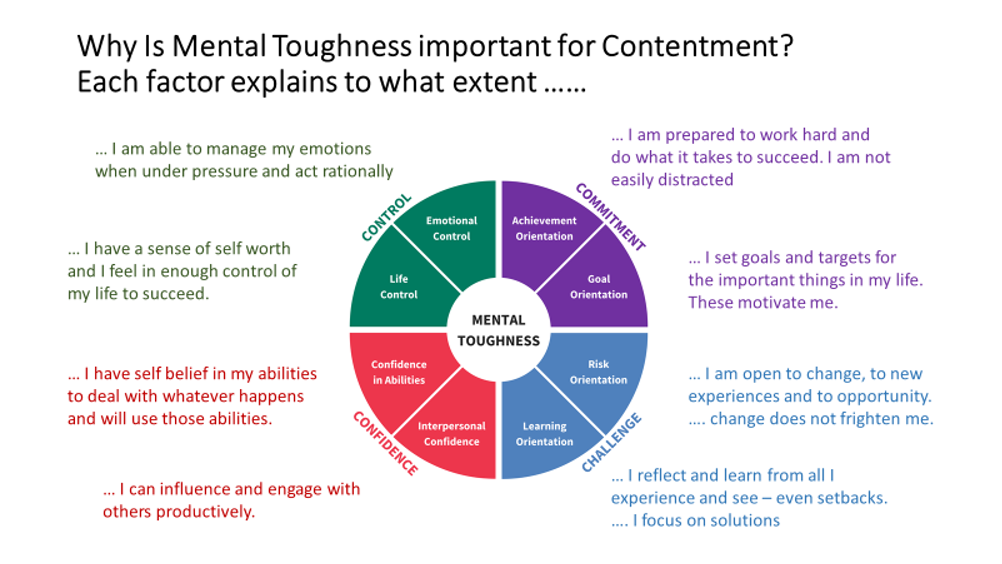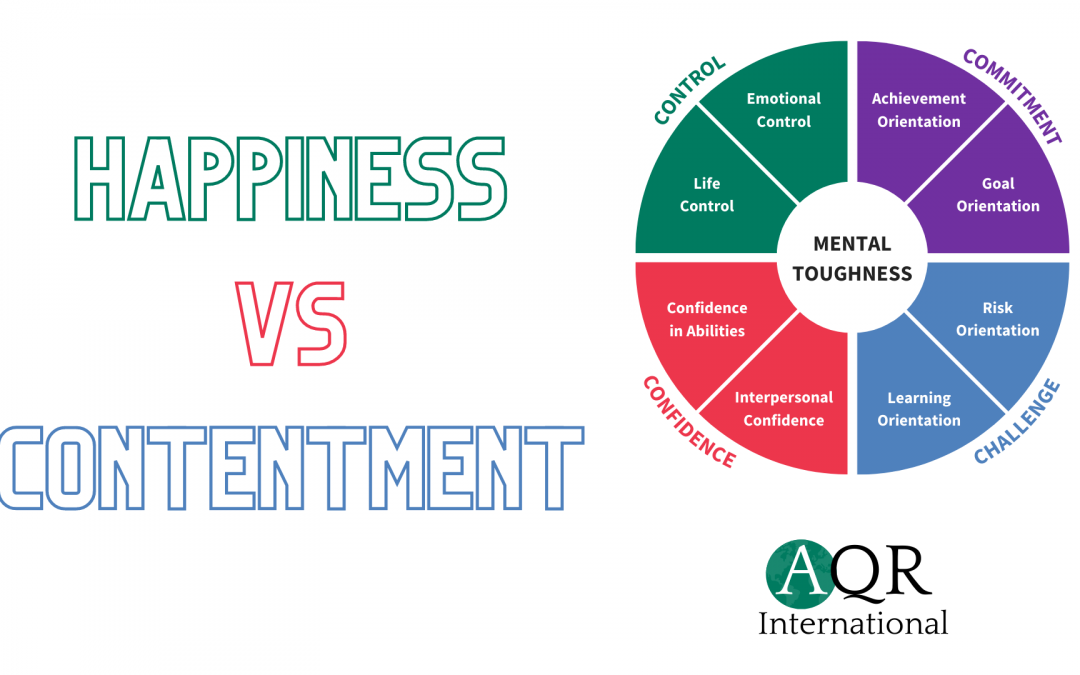Happiness v Contentment. Is there a difference and does it matter?
How does understanding Mental Toughness matter?
Happiness is a term that is very widely used to describe a state to which, it seems, we should all aspire. Use the term in a discussion and all will have a sense of what you are talking about. However, it is very much a “hoover“ term which we might all use but, dig deeper, it will actually mean something different for each person.
Use the term contentment and some will align it with “happiness”, others won’t.
So, is there a difference and does it matter?
There is and it does matter. This has been understood for a long time – at least all the way back to Plato. Plato was very much pre-occupied with what would constitute a healthy and harmonious life and understood there was a difference between the two concepts
If we look at dictionary definitions, Happiness is usually described as a state of being happy or feeling pleasure. It is generally dependant on factors outside of the individual. It can embrace notions of hedonism and a kind of reliance on the material world.
Contentment, when defined, carries the notion of a state of being satisfied. This comes largely from within. Having a sense that we are where we are, our life is good in a way that matters and that we have the potential to enhance that.
This draws out an important difference between happiness and contentment in that, while happiness denotes an emotional state, which is more short term, sometimes fleetingly temporary, contentment refers to a state, which is much more long term.
Another complication is that the term Happiness is commonly used by economists, philosophers and psychologists. Each attaches a different meaning.
When we are looking at the subject through the lens of the Mental Toughness concept, we are looking at the psychological meaning and, more specifically we are we are concerned with Wellbeing.
Well-being can be described in two ways. Firstly, there is subjective wellbeing. This is what we mean by the state called happiness.
As we see above, it will often have a material undertone. It can be dependent on having something, a possession, that others have or that others don’t have It is also often associated with ideas such as avoiding challenge and avoiding putting people at risk.
An alternative description is psychological wellbeing. This is driven by older traditions of motivation and satisfaction as described by people like Maslow and Hertzberg.
Here we are concerned with self-actualization and with being a fully functioning person accepting risk and meeting challenges. And understanding that hard work can produce reward and be its own reward. In addition, with any move forward the risk of failure cannot be far away.
Rather than describing psychological wellbeing as happiness, we can use a related term – contentment.
We can illustrate the difference through an exercise we have often used in presentations.
Addressing an individual in an audience, I would say “I have £100 in my left pocket. Today I am feeling generous. I plan to give you this £100. How do you feel about that?”
The response is almost always “Happy!”
Turning to another, usually close to the first person, I say “I have £500 in my right pocket. I would like to give this to you as a gift. How do you feel about that?”.
The answer again is very often “Happy” or “Pleased!”.
Turning now back to the first person I ask them “How do you now feel that I have given the other person a much bigger gift?”
I can now get one of two answers.
Either “Not happy, why did you give them more. You could have given that to me or even shared it”. Happiness has evaporated as quickly as it arose. This is determined by factors external to the individual.
Alternatively, I can get “I am content. I am still better off than I was 10 minutes ago. If someone else has done better that’s their good fortune. Life is like that”. This is contentment and is largely determined by the individual’s mental approach to the event.
Which is more valuable and more enduring – Happiness or Contentment?
The Mental Toughness concept helps us to understand how we might achieve contentment. Professor Peter Clough often describes a mentally tough individual as “one who, accepting life for what it is, is comfortable in their own skin”. Perhaps this is a form of neo-stoicism.
Mental Toughness is a personality trait that describes our (invisible) mental responses to events. We now know the concept has 4 elements – Control, Commitment, Challenge and Confidence. Each of these is supported by two independent factors. These are summarised below.

Each of these eight factors is an ingredient for contentment.
Finally, it can also be useful to look at the perspective a philosopher might adopt when looking at these concepts.
Generally, philosophers argue that happiness is not a proper goal for humans. Happiness is just an emotion, a transitory feeling, and not a useful or adequate purpose for life.
They suggest that it is infantile to expect to feel happy. Your life’s work should be something more enduring – like contentment or fulfilment of your potential or self-actualization. So, if we construct a checklist of the components which create lasting wellbeing, once again we find they are generally all described in the 4Cs Mental Toughness concept
The upshot is that it is unlikely you can make people happier in any meaningful way. Perhaps you can make people more content. Contentment is just as aspirational.
Ultimately, understanding Mental Toughness and being aware of our own and other’s Mental Toughness is the key to opening doors to opportunity and contentment and then having the psychological equipment to go through those doors.
Maslow’s self-actualization in practice perhaps!
We appreciate some may not agree with it all. That’s fine. We are confident in our views and in our capability to enable others to think about the language they use and the ideas they believe they espouse.
The MTQPlus is a very well evidenced psychometric measure which helps users to understand their mental toughness – to make the invisible, visible. If we know from where we are starting a development journey, it can be very effective.
If your interest is piqued to learn more about your own Mental Toughness profile and how to assess and develop Mental Toughness in others, please visit www.aqrinternational.co.uk. and if interested in being a licensed user, contact us through the site.
Feel free to connect with me too on LinkedIn or via doug@aqr.co.uk


